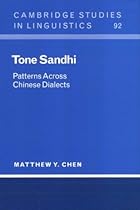《Grammar and analogy in Phonotactic well-formedness judgement》
http://www.linguistics.ucla.edu/general/dissertations/ShademanDissertationUCLA2007.pdf
《A method of Phonotactic and Phonotactic learning》
http://ling.ucsd.edu/events/colloquia/05-06/Hayes.pdf
2008年5月29日 星期四
[音韻] Acoustic-perceptual method(Beddor, Brasher, and Narayan...)
Narayan's curriculum vita http://www.sas.upenn.edu/~cnarayan/CV_cn.pdf
Articulatory characteristics of Hungarian ‘transparent’ vowels
Stefan Benusa, , 1, , and Adamantios I. Gafosa, b, http://www.sciencedirect.com/science?_ob=ArticleURL&_udi=B6WKT-4NN1TC1-1&_user=10&_rdoc=1&_fmt=&_orig=search&_sort=d&view=c&_acct=C000050221&_version=1&_urlVersion=0&_userid=10&md5=8a450928f61c8261d489dae2786b1daf
Michigan linguistics
http://ling.lsa.umich.edu/doc/home/newsletter06.pdf
Articulatory characteristics of Hungarian ‘transparent’ vowels
Stefan Benusa, , 1, , and Adamantios I. Gafosa, b, http://www.sciencedirect.com/science?_ob=ArticleURL&_udi=B6WKT-4NN1TC1-1&_user=10&_rdoc=1&_fmt=&_orig=search&_sort=d&view=c&_acct=C000050221&_version=1&_urlVersion=0&_userid=10&md5=8a450928f61c8261d489dae2786b1daf
Michigan linguistics
http://ling.lsa.umich.edu/doc/home/newsletter06.pdf
[華教] Journal Paper~《再論漢語的變調與重音》~許慧娟

http://www.ling.sinica.edu.tw/eip/FILES/journal/2008.1.21.23626345.1597784.pdf
The reason why I chose to read this article is due to my curiosity of Chinese tone sandhi. In the class of teaching Chinese I havd taken at graduate, I found that I am very curious about tone sandhi. Why does it happen? How can we find the rules? How can we, the native speakers, might not aware of this change? Why tone sandhi is reflected on the written form?
《Tone sandhi : Patterns across Chinese dialects》
http://books.google.com.tw/books?id=qkS6fcdKh0QC&dq=tone+sandhi&pg=PP1&ots=0hxAWPCkuz&sig=Y828OtQIIPxFfw9ZYj0ZGsRKgr0&hl=zh-TW&prev=http://www.google.com.tw/search%3Fcomplete%3D1%26hl%3Dzh-TW%26q%3Dtone%2Bsandhi&sa=X&oi=print&ct=title&cad=one-book-with-thumbnail
Wiki-pedia
http://en.wikipedia.org/wiki/Tone_sandhi
Mandrin Tone Sandhi
http://www.chinese-forums.com/showthread.php?t=6008
Hakka Tone Sandhi
http://www.ling.sinica.edu.tw/eip/FILES/journal/2007.3.9.46018617.8850744.pdf
Taiwanese Tone Sandhi
http://chinese.fudan.edu.cn/phoneticslab/yuyin5/papers/04-13-110.pdf
The reason why I chose to read this article is due to my curiosity of Chinese tone sandhi. In the class of teaching Chinese I havd taken at graduate, I found that I am very curious about tone sandhi. Why does it happen? How can we find the rules? How can we, the native speakers, might not aware of this change? Why tone sandhi is reflected on the written form?
《Tone sandhi : Patterns across Chinese dialects》
http://books.google.com.tw/books?id=qkS6fcdKh0QC&dq=tone+sandhi&pg=PP1&ots=0hxAWPCkuz&sig=Y828OtQIIPxFfw9ZYj0ZGsRKgr0&hl=zh-TW&prev=http://www.google.com.tw/search%3Fcomplete%3D1%26hl%3Dzh-TW%26q%3Dtone%2Bsandhi&sa=X&oi=print&ct=title&cad=one-book-with-thumbnail
Wiki-pedia
http://en.wikipedia.org/wiki/Tone_sandhi
Mandrin Tone Sandhi
http://www.chinese-forums.com/showthread.php?t=6008
Hakka Tone Sandhi
http://www.ling.sinica.edu.tw/eip/FILES/journal/2007.3.9.46018617.8850744.pdf
Taiwanese Tone Sandhi
http://chinese.fudan.edu.cn/phoneticslab/yuyin5/papers/04-13-110.pdf
2008年5月24日 星期六
[華教] 漢語網路字典資源
字典網 http://www.zhongwen.com/zi.htm
http://140.111.34.46/dict/國語辭典
http://140.111.34.46/chengyu/sort_text.htm
http://140.111.1.43/
http://140.111.1.40/
教育部四部電子辭典簡介
重編國語辭典修訂本
國語辭典簡編本
國語小字典
異體字字典
成語典
四部電子辭典簡介
四部電子辭典使用說明
http://www.edu.tw/
國語辭典:http://140.111.34.46/dict/ 重編國語辭典修訂本:http://www.sinica.edu.tw/~tdbproj/dict/ 國語辭典簡編本:http://140.111.1.22/clc/jdict/main/cover/main.htm 異體字字典:http://140.111.1.40/main.htm 成語典:http://140.111.34.46/chengyu/sort_pho.htm 漢語大詞典:http://www.ewen.cc/hd20 成語詞典:http://www.kingsnet.biz/asp/chengyu/index.asp 成語智能檢索:http://www.doc.net.cn/component/option,com_ideidiom/Itemid,27/ 在線漢英雙解新華字典:http://www.imagecode.net/asp.net/dict.aspx 中國石材供求網網上新華字典:http://www.stone163.com/skill/20040103dictionary/find.htm 新華字典:http://www.fzepc.com/chinapoem/word.asp 在線漢語字典:http://www.zdic.net/ 現代漢語規範字典、中學生規範詞典、現代漢語詞語規範詞典(界面左邊)http://www.china-language.gov.cn/ 說文解字註:http://www.gg-art.com/imgbook/index.php?bookid=53 文字源流淺析:http://www.gg-art.com/imgbook/index.php?bookid=60 說文解字:http://www.chinese99.com/xiaozhuan/shuowen/ 文泉驛康熙字典:http://wqy.sourceforge.net/cgi-bin/index.cgi?KangXi 儒學詞典:http://humanum.arts.cuhk.edu.hk/ConfLex/ 佛學大詞典:http://www.fowang.org/fxd/lookup.htm 華文字句搜尋網:http://www.cbooks.org/main.asp 搜文解字:http://cls.admin.yzu.edu.tw/swjz/index.html 東方語言學網的中古音查詢:http://www.eastling.org/tdfweb/midage.aspx方言查詢、民族語查詢、語言學著作目錄查詢、語言學論文目錄查詢、學位論文目錄查詢漢越字典:http://perso.wanadoo.fr/dang.tk/langues/hanviet.htm 越南語漢字讀音檢索:http://www.nomfoundation.org/nomdb/lookup.php (如果查「北」的讀音,選擇mandarin,鍵入普通話的拼音bei3,就可查出越南語的讀音)漢字台語(閩南話)、客語、古音查詢系統:http://linux.taigi.idv.tw/jiim.shtml 閩南話/華文線上字典:http://203.64.42.21/iug/ungian/Soannteng/chil/Taihoa.asp 台語(閩南話)辭典:http://daiwanway.dynip.com/cgi/tdict.acgi 台灣話語音漢字辭典http://www.edutech.org.tw/dict/Sutiern0.htm 黃錫凌粵音韻匯電子版:http://humanum.arts.cuhk.edu.hk/Lexis/Canton/粵語會館的粵音字典: http://www.yueyu.net/yykt/yyzd.htmChinese languages :http://www.chinalanguage.com/Hakka林語堂當代漢英詞典電子版:http://humanum.arts.cuhk.edu.hk/Lexis/Lindict/ 中文:http://www.zhongwen.com/ 字音、部首、筆畫數、字典網可查一些英語單詞:http://www.onelook.com/ 全文檢索(包含單字檢索和內容檢索):http://140.111.1.43/b1/b1.html 詞霸搜索-免費在線詞典查詞翻譯_英漢_日漢_英語_成語:http://cb.kingsoft.com/ 說文小篆檢索:http://www.chinese99.com/xiaozhuan/ 粵語審音配詞字庫(繁體):http://humanum.arts.cuhk.edu.hk/Lexis/lexi-can/ 現代標準漢語與粵語對照資料庫:http://hanyu.chi.cuhk.edu.hk/
http://140.111.34.46/dict/國語辭典
http://140.111.34.46/chengyu/sort_text.htm
http://140.111.1.43/
http://140.111.1.40/
教育部四部電子辭典簡介
重編國語辭典修訂本
國語辭典簡編本
國語小字典
異體字字典
成語典
四部電子辭典簡介
四部電子辭典使用說明
http://www.edu.tw/
國語辭典:http://140.111.34.46/dict/ 重編國語辭典修訂本:http://www.sinica.edu.tw/~tdbproj/dict/ 國語辭典簡編本:http://140.111.1.22/clc/jdict/main/cover/main.htm 異體字字典:http://140.111.1.40/main.htm 成語典:http://140.111.34.46/chengyu/sort_pho.htm 漢語大詞典:http://www.ewen.cc/hd20 成語詞典:http://www.kingsnet.biz/asp/chengyu/index.asp 成語智能檢索:http://www.doc.net.cn/component/option,com_ideidiom/Itemid,27/ 在線漢英雙解新華字典:http://www.imagecode.net/asp.net/dict.aspx 中國石材供求網網上新華字典:http://www.stone163.com/skill/20040103dictionary/find.htm 新華字典:http://www.fzepc.com/chinapoem/word.asp 在線漢語字典:http://www.zdic.net/ 現代漢語規範字典、中學生規範詞典、現代漢語詞語規範詞典(界面左邊)http://www.china-language.gov.cn/ 說文解字註:http://www.gg-art.com/imgbook/index.php?bookid=53 文字源流淺析:http://www.gg-art.com/imgbook/index.php?bookid=60 說文解字:http://www.chinese99.com/xiaozhuan/shuowen/ 文泉驛康熙字典:http://wqy.sourceforge.net/cgi-bin/index.cgi?KangXi 儒學詞典:http://humanum.arts.cuhk.edu.hk/ConfLex/ 佛學大詞典:http://www.fowang.org/fxd/lookup.htm 華文字句搜尋網:http://www.cbooks.org/main.asp 搜文解字:http://cls.admin.yzu.edu.tw/swjz/index.html 東方語言學網的中古音查詢:http://www.eastling.org/tdfweb/midage.aspx方言查詢、民族語查詢、語言學著作目錄查詢、語言學論文目錄查詢、學位論文目錄查詢漢越字典:http://perso.wanadoo.fr/dang.tk/langues/hanviet.htm 越南語漢字讀音檢索:http://www.nomfoundation.org/nomdb/lookup.php (如果查「北」的讀音,選擇mandarin,鍵入普通話的拼音bei3,就可查出越南語的讀音)漢字台語(閩南話)、客語、古音查詢系統:http://linux.taigi.idv.tw/jiim.shtml 閩南話/華文線上字典:http://203.64.42.21/iug/ungian/Soannteng/chil/Taihoa.asp 台語(閩南話)辭典:http://daiwanway.dynip.com/cgi/tdict.acgi 台灣話語音漢字辭典http://www.edutech.org.tw/dict/Sutiern0.htm 黃錫凌粵音韻匯電子版:http://humanum.arts.cuhk.edu.hk/Lexis/Canton/粵語會館的粵音字典: http://www.yueyu.net/yykt/yyzd.htmChinese languages :http://www.chinalanguage.com/Hakka林語堂當代漢英詞典電子版:http://humanum.arts.cuhk.edu.hk/Lexis/Lindict/ 中文:http://www.zhongwen.com/ 字音、部首、筆畫數、字典網可查一些英語單詞:http://www.onelook.com/ 全文檢索(包含單字檢索和內容檢索):http://140.111.1.43/b1/b1.html 詞霸搜索-免費在線詞典查詞翻譯_英漢_日漢_英語_成語:http://cb.kingsoft.com/ 說文小篆檢索:http://www.chinese99.com/xiaozhuan/ 粵語審音配詞字庫(繁體):http://humanum.arts.cuhk.edu.hk/Lexis/lexi-can/ 現代標準漢語與粵語對照資料庫:http://hanyu.chi.cuhk.edu.hk/
[音韻] 至少在中國大陸的語言學界,英語PHONOLOGY的翻譯是「音系學」
Talk:音韻學
維基百科,自由的百科全書
跳轉到: 導航, 搜尋
我不同意本頁的內容。至少在中國大陸的語言學界,英語PHONOLOGY的翻譯是「音系學」,而「音韻學」的使用範圍限於漢語歷史語言學。 向柏霖 12:03 2004年6月10日 (UTC)
這一頁的內容的確有待討論,參考:Talk:漢語音韻學。 --mingwangx 19:17 2004年6月10日 (UTC)
[編輯] 音韻學和音系學
from Wikipedia:互助客棧/其他
本來打算動手做英語音系學 (English phonology)這條目,可是不知怎樣命名,於是發覺要先清楚界定標題兩個詞語。我看過商務出的語言學辭典(中國大陸),搜尋過中國大百科全書(台灣)、大英百科全書(台灣)和港版牛津高階英漢辭典,都說Phonology就是音系學。其中,只有中國大百科也列出音韻學(和聲韻學),表示二詞都是同義詞。
很久以前,有朋友作過一些討論,結論是兩個詞語有中國大陸和台灣之分,於是連重定向頁的去向也有簡繁之分。可是我認為,音韵学還是該重定向到音韻學,因為它們根本是同一概念(名字),而且簡體者專指的「漢語音韻學」早已作消歧義處理,列在條目最頂,又何需用這個重定向?
我有幾項建議:在音韻學增加說明文字,表示音韻學和音系學(也和聲韻學[這個較少用])同義,但是「音韻學多數指漢語的音韻學」。這些同義詞全部導向「音韻學」。既然是同義詞,就不必另創Category:音系學等分類。分類數目維持不變,音韻學分類用來收錄音韻學理論的條目、英語音系學、法語音系學等條目。
有朋友已經創建了漢語音韻學分類,故此建議將所有專門描述漢語音韻的條目都放在此分類,正如英語維基有關英語音系的條目內容多、數目多,於是Category:English phonology就獨立出來。換句話說,現時部份仍在音韻學分類的漢語條目要改分類。
外語音系學條目又怎樣命名呢?由於音韻學跟漢語有很多關聯,我認為外語的全部稱為「x語音系學」比較適合。況且,Phonology這個詞,多數譯成音系學的,在大陸和台灣的用法都差不多一樣。
--Xieza 08:33 2007年1月21日 (UTC)
支持將外語部分名為「x語音系學」以及分類的提議。--RalfX(議) 09:31 2007年1月21日 (UTC)
基本上我同意Xieza的說法,但是除了一點:聲韻學並不能等同音系學和音韻學;聲韻學一般來說專指研究漢語聲、韻、調的那門學問,約略等同於漢語音韻學(但是嚴格來說在學術傳統上又有超出其範圍的地方)。--mingwangx (talk) 15:57 2007年1月21日 (UTC)
補充說明一下:聲韻學非常著重於歷時的研究,這一點與其他語言的phonology非常之不同,因此,與其說他是屬於一種音韻學,不如將之歸於歷史語言學。--mingwangx (talk) 16:02 2007年1月21日 (UTC)
我覺得聲韻學和音韻學是同義詞,重視歷時研究(可以找到很多叫《漢語音韻學》的書,指的肯定是講古漢語的),也不僅限於漢語,和漢語相關的朝鮮語、越南語、白語等也可以說。-- polyhedron(古韻) 留言 17:53 2007年1月21日 (UTC)
我想這個問題得先釐清一件事:目前一般常提到的「漢語音韻學」不是「漢語的音韻學」,而是在中國的歷時語言研究傳統中產生的一個特殊學門。--mingwangx (talk) 06:26 2007年1月27日 (UTC)
維基百科,自由的百科全書
跳轉到: 導航, 搜尋
我不同意本頁的內容。至少在中國大陸的語言學界,英語PHONOLOGY的翻譯是「音系學」,而「音韻學」的使用範圍限於漢語歷史語言學。 向柏霖 12:03 2004年6月10日 (UTC)
這一頁的內容的確有待討論,參考:Talk:漢語音韻學。 --mingwangx 19:17 2004年6月10日 (UTC)
[編輯] 音韻學和音系學
from Wikipedia:互助客棧/其他
本來打算動手做英語音系學 (English phonology)這條目,可是不知怎樣命名,於是發覺要先清楚界定標題兩個詞語。我看過商務出的語言學辭典(中國大陸),搜尋過中國大百科全書(台灣)、大英百科全書(台灣)和港版牛津高階英漢辭典,都說Phonology就是音系學。其中,只有中國大百科也列出音韻學(和聲韻學),表示二詞都是同義詞。
很久以前,有朋友作過一些討論,結論是兩個詞語有中國大陸和台灣之分,於是連重定向頁的去向也有簡繁之分。可是我認為,音韵学還是該重定向到音韻學,因為它們根本是同一概念(名字),而且簡體者專指的「漢語音韻學」早已作消歧義處理,列在條目最頂,又何需用這個重定向?
我有幾項建議:在音韻學增加說明文字,表示音韻學和音系學(也和聲韻學[這個較少用])同義,但是「音韻學多數指漢語的音韻學」。這些同義詞全部導向「音韻學」。既然是同義詞,就不必另創Category:音系學等分類。分類數目維持不變,音韻學分類用來收錄音韻學理論的條目、英語音系學、法語音系學等條目。
有朋友已經創建了漢語音韻學分類,故此建議將所有專門描述漢語音韻的條目都放在此分類,正如英語維基有關英語音系的條目內容多、數目多,於是Category:English phonology就獨立出來。換句話說,現時部份仍在音韻學分類的漢語條目要改分類。
外語音系學條目又怎樣命名呢?由於音韻學跟漢語有很多關聯,我認為外語的全部稱為「x語音系學」比較適合。況且,Phonology這個詞,多數譯成音系學的,在大陸和台灣的用法都差不多一樣。
--Xieza 08:33 2007年1月21日 (UTC)
支持將外語部分名為「x語音系學」以及分類的提議。--RalfX(議) 09:31 2007年1月21日 (UTC)
基本上我同意Xieza的說法,但是除了一點:聲韻學並不能等同音系學和音韻學;聲韻學一般來說專指研究漢語聲、韻、調的那門學問,約略等同於漢語音韻學(但是嚴格來說在學術傳統上又有超出其範圍的地方)。--mingwangx (talk) 15:57 2007年1月21日 (UTC)
補充說明一下:聲韻學非常著重於歷時的研究,這一點與其他語言的phonology非常之不同,因此,與其說他是屬於一種音韻學,不如將之歸於歷史語言學。--mingwangx (talk) 16:02 2007年1月21日 (UTC)
我覺得聲韻學和音韻學是同義詞,重視歷時研究(可以找到很多叫《漢語音韻學》的書,指的肯定是講古漢語的),也不僅限於漢語,和漢語相關的朝鮮語、越南語、白語等也可以說。-- polyhedron(古韻) 留言 17:53 2007年1月21日 (UTC)
我想這個問題得先釐清一件事:目前一般常提到的「漢語音韻學」不是「漢語的音韻學」,而是在中國的歷時語言研究傳統中產生的一個特殊學門。--mingwangx (talk) 06:26 2007年1月27日 (UTC)
2008年5月15日 星期四
[音韻] Merges the questions
How and why does pronunciation change over time?
Different dialects and languages
Sound change (Historical change)
How is speech acquired as first language and as a subsequent language?
Language acquisitions and phonology
Different dialects and languages
Sound change (Historical change)
How is speech acquired as first language and as a subsequent language?
Language acquisitions and phonology
[音韻] My 8 questions in phonology
1. Autosemental phonology like, tone Sandhi in Chinese
2. Sound change (Historical change)
3. Current phonological findings and research.
4. Methods of the current phonology
5. Language acquisitions and phonology
6. Science and phonology
7. Application of phonology
8. The previous phonology
2. Sound change (Historical change)
3. Current phonological findings and research.
4. Methods of the current phonology
5. Language acquisitions and phonology
6. Science and phonology
7. Application of phonology
8. The previous phonology
訂閱:
文章 (Atom)
